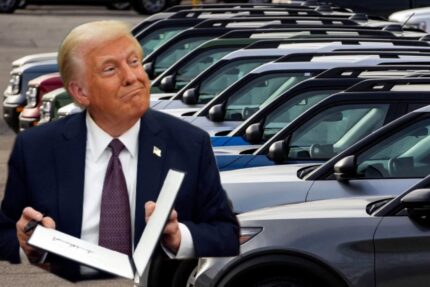U.S. President Donald Trump announced a 25% import tax on foreign cars and auto parts, global automakers faced a brutal market reaction. Investors dumped shares of car giants across Japan, Germany, and the UK, wiping out billions in market value. Major brands such as Toyota, BMW, and Jaguar Land Rover saw sharp declines, with firms in the U.S. also taking a hit. General Motors (GM) lost more than 7% in stock value, while Ford and Stellantis braced for financial fallout.
Even Tesla, which manufactures all its vehicles in the U.S., was not entirely shielded. CEO Elon Musk warned that the new Trump tariffs would still impact his company. “Important to note that Tesla is NOT unscathed here,” Musk posted on social media, emphasizing that supply chains are global, and costs would inevitably rise. Research by Cars.com indicated that even Tesla’s top-selling Model Y only sources 70% of its parts domestically, further proving that no automaker is fully immune.
Rising Costs and Limited Choices for Consumers
The most immediate consequence of Trump’s tariffs will be higher prices for consumers. Analysts at Macquarie estimate that the Trump’s tariffs could affect up to $400 billion worth of imports, pushing vehicle prices up by $4,000 to $12,000, depending on the model. Bernstein Research projected that average price hikes would be around $3,700 per vehicle, with some estimates reaching nearly $6,000. Luxury brands like Ferrari have already announced a 10% price increase on some models, although their high-income clientele may not be significantly deterred.
Beyond price hikes, consumers could face fewer choices. Automakers struggling with increased costs may cut back on production or eliminate certain models from their U.S. offerings. The result? A more expensive and less diverse car market, where affordability takes a hit, and middle-class buyers may be forced to settle for used vehicles or delay purchases.
Detroit’s Big Three Brace for Impact
America’s “Big Three” automakers—GM, Ford, and Stellantis—are expected to bear the brunt of the new Trump’s tariffs due to their reliance on global supply chains. Analysts predict that GM and Ford could see their earnings before interest and taxes (EBIT) drop by as much as 30%. JP Morgan estimated that GM alone could face additional costs of $10.5 billion, while Ford’s expenses would begin at $2 billion and more than double over time.
Interestingly, Stellantis may be better positioned than its rivals. The company’s significant production footprint in Mexico—where auto parts remain exempt from tariffs, at least temporarily—could provide a buffer against the worst effects. Meanwhile, Rivian and Tesla, which manufacture all their vehicles domestically, may gain a competitive advantage over foreign and globally integrated automakers.
Foreign Carmakers Face Heavy Losses
For foreign automakers, Trump’s tariffs present an even bigger challenge. Volvo, which manufactures only 13% of its U.S.-sold vehicles domestically, is among the hardest hit. Other major brands such as Mazda (19%), Volkswagen (21%), and Hyundai (33%) also face steep cost increases due to their reliance on imports. Even Mercedes, BMW, and Toyota, which manufacture less than 50% of their U.S.-sold vehicles in the country, will struggle with rising expenses.
Bernstein analysts estimated that the new import duties could add up to $110 billion in annual tariff costs for the industry. This leaves foreign automakers with a difficult choice: absorb the losses, reduce model availability, or pass the higher costs onto consumers. None of these options bode well for their long-term competitiveness in the U.S. market.
Economic and Political Implications Trump’s tariffs
The Trump administration defended the tariffs as a means to boost domestic manufacturing and generate up to $100 billion in annual tax revenue. Trump’s administration argued that the measure would push automakers to invest more in American production facilities, thereby creating jobs and strengthening the country’s manufacturing base.
However, critics argue that the tariffs could backfire by slowing down auto sales, discouraging investment, and triggering retaliatory tariffs from affected nations. Industry leaders, including Jennifer Safavian of Autos Drive America, have warned that the policy will lead to job losses, reduced production, and economic uncertainty.
As the April 3 implementation date looms, automakers and consumers alike are bracing for significant disruptions. Whether Trump’s tariffs will achieve their intended goal of revitalizing American manufacturing—or merely inflict widespread financial pain—remains to be seen.














